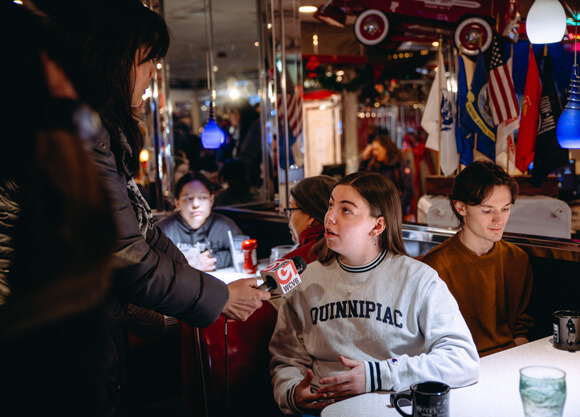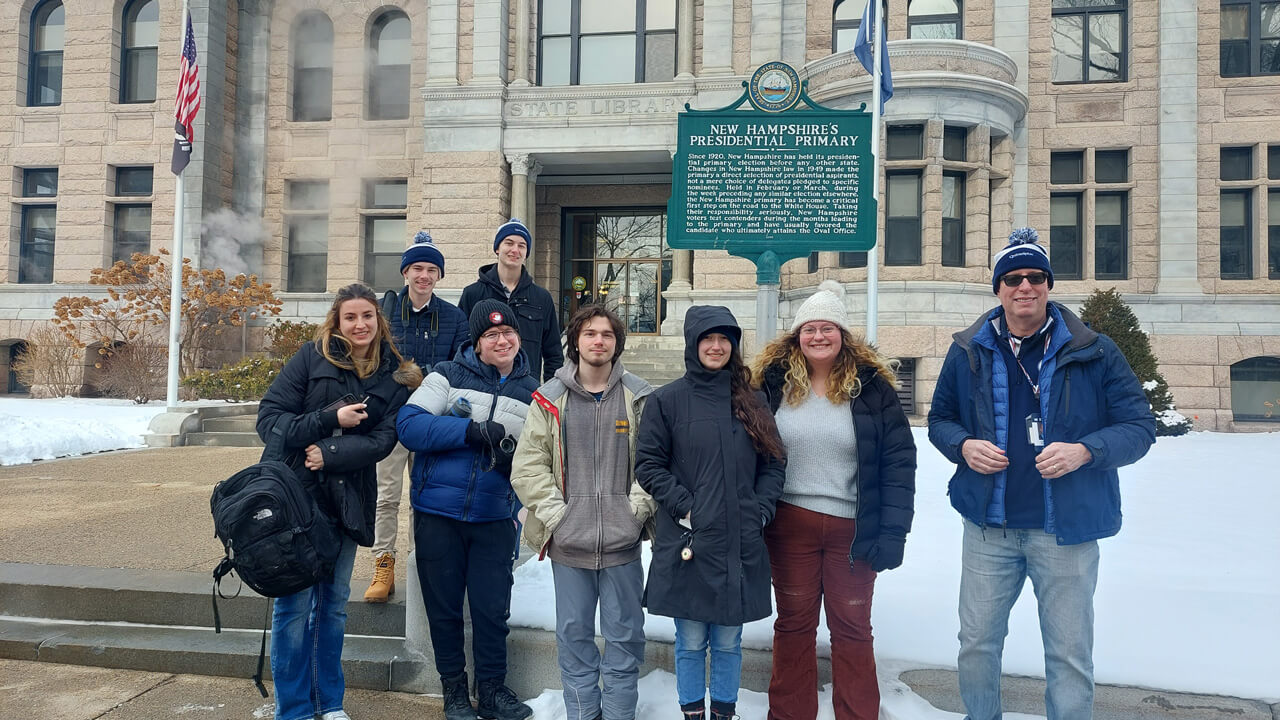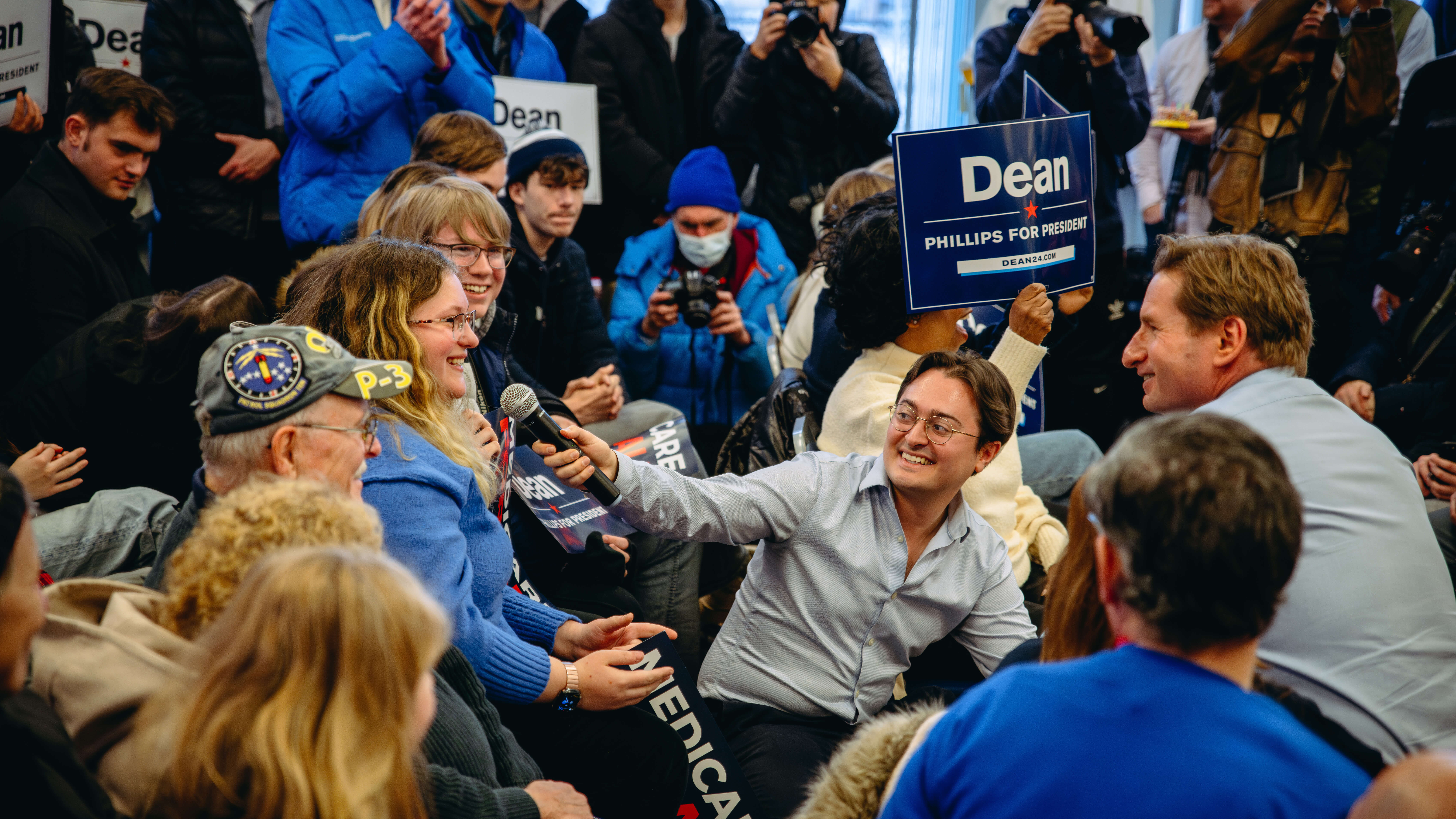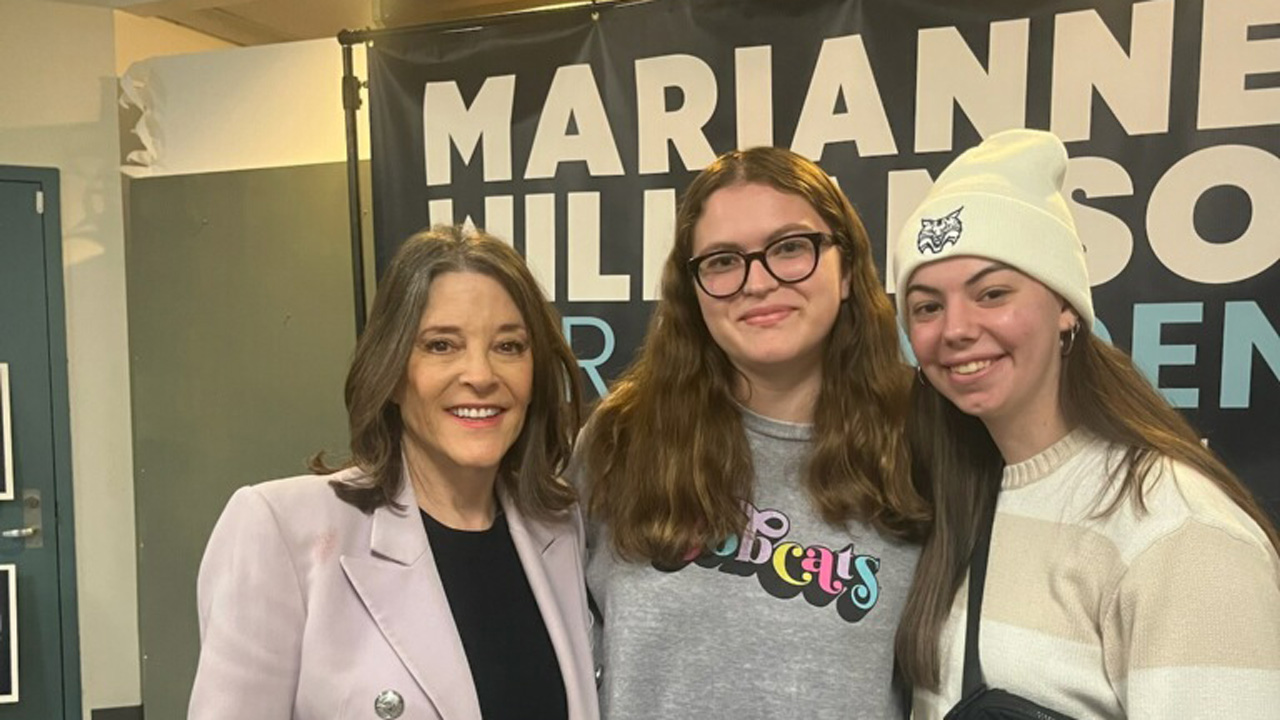
New Hampshire primary offers students insight into voter, candidate behavior
January 22, 2024

January 22, 2024

“This is the ideal setting to see the political process up close. New Hampshire is such a small area that it’s possible to hear from all of the presidential candidates in one state during a matter of days,” said McLean, professor of political science. “New Hampshire holds a unique position in the presidential nomination process. Not only is it significant because it’s the first primary of this presidential cycle, but also because that distinction is built into the collective memory of the state itself. It’s part of the state’s character with very intense, very informed voters.”
For the six days leading up to the primary election on January 23, Quinnipiac students will trek across the state to multiple venues, endure freezing temperatures in long lines and sit patiently under hot lights for the opportunity to interact directly with the presidential hopefuls for the 2024 election.
“In addition to meeting with voters and candidates, my hope is that the students learn more about the details of the process itself, like how these events are designed and what it takes to fill an audience as well as the stage management aspect of it all,” said McLean. “There is a lot of thought and work that goes into these types of events that seem very spontaneous and simple when you see them on TV.”
When compared to large campaign rally speeches, the smaller settings, considered a hallmark of the New Hampshire primary, provides voters the chance to engage in direct dialogue with the presidential candidates. For McLean, it’s that opportunity for students to talk and hear from candidates personally that makes the primary a valuable learning experience.
That is an important distinction because for some Quinnipiac students in the course, New Hampshire will mark their inaugural experience in the realm of political theater and candidate stump speeches.

“These are the first in-person campaign events of any campaign that I have gone to,” said law in society major Allison Garner ’26. “I’m really interested to see how the candidates treat the audience when they’re face-to-face and talking to the voters directly versus what we hear about them on social media, in commercials or through sound bites reported in the news.”
Since 2000, McLean has led a team of Quinnipiac students every four years to participate in the New Hampshire primary. In the past, individuals would select and volunteer on one campaign, often making phone calls or going door-to-door to canvas voters on a candidate’s behalf.
This year, students will view the primary through the lens of “social science observer,” studying candidate and voter behavior with a technique called “city as text.” Students will be attending as many political rallies and candidate events as possible, not as campaign volunteers, but as witnesses of the democratic process. Their objective is to engage people in conversations without debate or persuasion.
“One important learning goal in this course is grounded in observations – paying attention to your surroundings and decoding the rituals and symbols while noting who is following or breaking them,” explained McLean. “We will also look at the set of expectations and norms in the primary, such as diner visits, patriotic imagery, yard signs and the deployment of party identities. New Hampshire’s process says a lot about the kind of politics we could have in this country. A process where people might be able to have a more significant connection to the candidates and their parties.”
With new events being added every hour leading up to Tuesday’s primary vote, the students diligently scroll through online candidate calendars each night to organize schedules for the next day. Then they wake up and do it all over again.
As the New Hampshire presidential primary kicked into full swing over the weekend, the teams attended a variety of events for candidates of both parties including Nikki Haley, Ron DeSantis, Marianne Williamson, Dean Phillips and Donald Trump. On Saturday, students participated in several small venue town halls while another group spent the coldest day of January waiting outside to attend the Donald Trump rally in downtown Manchester.
 For junior Zoe McLaughlin ’25, the experience has provided an opportunity to listen and observe both sides of the political race and reflect on the multiple ways supporters of both parties share more similarities than differences.
For junior Zoe McLaughlin ’25, the experience has provided an opportunity to listen and observe both sides of the political race and reflect on the multiple ways supporters of both parties share more similarities than differences.
“When it comes to things like human rights, human decency and tolerance, most people are not how they are portrayed in the media. Most people are not extremists,” said McLaughlin after a Dean Phillips town hall where she was able to ask the candidate a question about LGBTQ+ advocacy. “I think it’s really important to get messages across that promote unity and tolerance. That’s how we can get to a more accepting society where we can all feel welcome.”
The kick-off to their New Hampshire primary experience began with a Connecticut media press conference on Thursday morning at Quinnipiac’s Mount Carmel Campus. It would be the first of many media interactions throughout the week.
At the DeSantis town hall on Friday, senior Jack Spiegel ’24 ran into two former C-SPAN co-workers from his QU in DC spring internship. As a journalism major with a political science minor, the primary provides an excellent opportunity to blend his two favorite interests, broadcast media and politics, into one experience.
“I’m very interested in what the local people are looking for in their candidates,” said Spiegel. “I think that the media plays an interesting role in this process, especially during presidential campaigns. Too often, I think the media is used as a scapegoat for candidates. So, it’s interesting to watch first-hand how they use the media as a tool in debates, or in New Hampshire’s case, lack of debates, and how candidates are maximizing their time in media coverage.”
 As she waited in line for the same Ron DeSantis town hall, Jamison “Jamie” Setzler ’25 was interviewed by the national host of “FOX News Sunday,” Shannon Bream, moments before Garner was approached by Boston reporter Sharman Sacchetti for an interview with WCVB Ch. 5.
As she waited in line for the same Ron DeSantis town hall, Jamison “Jamie” Setzler ’25 was interviewed by the national host of “FOX News Sunday,” Shannon Bream, moments before Garner was approached by Boston reporter Sharman Sacchetti for an interview with WCVB Ch. 5.
“A couple of different reporters have asked about the debates and if we were disappointed that they were canceled,” said Garner. “But in this primary environment, when one door closes, another one always opens and leads us to find a different event. It’s all about going with the flow and figuring out where and when we want to be next.”
From event to event, the Quinnipiac group began to recognize familiar faces in each crowd as the community of “political tourists” began to form and grow organically around this year’s primary.
“I think people here are excited about the candidates’ visits, which is why New Hampshire fought so hard to keep its status as the first-in-the-nation primary,” said McLaughlin. “It’s such a point of pride for this state, and it shows. I’m glad to see the community supporting the process with so many people open to new ideas and different viewpoints.”
Quinnipiac Today is your source for what's happening throughout #BobcatNation. Sign up for our weekly email newsletter to be among the first to know about news, events and members of our Bobcat family who are making a positive difference in our world.
Sign Up Now